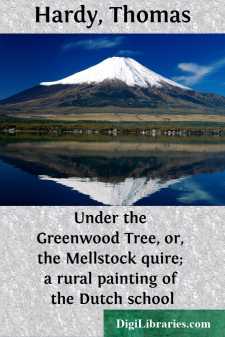Categories
- Antiques & Collectibles 13
- Architecture 36
- Art 48
- Bibles 22
- Biography & Autobiography 813
- Body, Mind & Spirit 142
- Business & Economics 28
- Children's Books 17
- Children's Fiction 14
- Computers 4
- Cooking 94
- Crafts & Hobbies 4
- Drama 346
- Education 46
- Family & Relationships 57
- Fiction 11829
- Games 19
- Gardening 17
- Health & Fitness 34
- History 1377
- House & Home 1
- Humor 147
- Juvenile Fiction 1873
- Juvenile Nonfiction 202
- Language Arts & Disciplines 88
- Law 16
- Literary Collections 686
- Literary Criticism 179
- Mathematics 13
- Medical 41
- Music 40
- Nature 179
- Non-Classifiable 1768
- Performing Arts 7
- Periodicals 1453
- Philosophy 64
- Photography 2
- Poetry 896
- Political Science 203
- Psychology 42
- Reference 154
- Religion 513
- Science 126
- Self-Help 84
- Social Science 81
- Sports & Recreation 34
- Study Aids 3
- Technology & Engineering 59
- Transportation 23
- Travel 463
- True Crime 29
Thomas Hardy
Thomas Hardy (1840-1928) was an English novelist and poet, known for his depiction of the rural life and social issues in the Victorian era. His notable works include "Tess of the d'Urbervilles," "Far from the Madding Crowd," and "Jude the Obscure," which often explore themes of fate, love, and the struggle against societal constraints. Hardy's writing is characterized by its rich, descriptive style and profound pessimism, reflecting his belief in the indifferent nature of the universe.
Author's Books:
Sort by:
by:
Thomas Hardy
PREFACE This story of the Mellstock Quire and its old established west-gallery musicians, with some supplementary descriptions of similar officials in Two on a Tower, A Few Crusted Characters, and other places, is intended to be a fairly true picture, at first hand, of the personages, ways, and customs which were common among such orchestral bodies in the villages of fifty or sixty years ago. One is...
more...
by:
Thomas Hardy
AN UPBRAIDING Now I am dead you sing to me The songs we used to know,But while I lived you had no wish Or care for doing so. Now I am dead you come to me In the moonlight, comfortless;Ah, what would I have given alive To win such tenderness! When you are dead, and stand to me Not differenced, as now,But like again, will you be cold As when we lived, or how? "These...
more...
by:
Thomas Hardy
1. I. A SUPPOSITITIOUS PRESENTMENT OF HER A person who differed from the local wayfarers was climbing the steep road which leads through the sea-skirted townlet definable as the Street of Wells, and forms a pass into that Gibraltar of Wessex, the singular peninsula once an island, and still called such, that stretches out like the head of a bird into the English Channel. It is connected with the...
more...
by:
Thomas Hardy
1. DECEMBER AND JANUARY, 1835-36 In the long and intricately inwrought chain of circumstance which renders worthy of record some experiences of Cytherea Graye, Edward Springrove, and others, the first event directly influencing the issue was a Christmas visit. In the above-mentioned year, 1835, Ambrose Graye, a young architect who had just begun the practice of his profession in the midland town of...
more...
by:
Thomas Hardy
I A Saturday afternoon in November was approaching the time of twilight, and the vast tract of unenclosed wild known as Egdon Heath embrowned itself moment by moment. Overhead the hollow stretch of whitish cloud shutting out the sky was as a tent which had the whole heath for its floor. The heaven being spread with this pallid screen and the earth with the darkest vegetation, their meeting-line at the...
more...
by:
Thomas Hardy
King’s-Hintock Court (said the narrator, turning over his memoranda for reference)—King’s-Hintock Court is, as we know, one of the most imposing of the mansions that overlook our beautiful Blackmoor or Blakemore Vale. On the particular occasion of which I have to speak this building stood, as it had often stood before, in the perfect silence of a calm clear night, lighted only by the cold shine...
more...
by:
Thomas Hardy
CHAPTER I. The rambler who, for old association or other reasons, should trace the forsaken coach-road running almost in a meridional line from Bristol to the south shore of England, would find himself during the latter half of his journey in the vicinity of some extensive woodlands, interspersed with apple-orchards. Here the trees, timber or fruit-bearing, as the case may be, make the wayside hedges...
more...
by:
Thomas Hardy
PREFACE. The changing of the old order in country manors and mansions may be slow or sudden, may have many issues romantic or otherwise, its romantic issues being not necessarily restricted to a change back to the original order; though this admissible instance appears to have been the only romance formerly recognized by novelists as possible in the case. Whether the following production be a picture...
more...
by:
Thomas Hardy
1. A STREET IN ANGLEBURY—A HEATH NEAR IT—INSIDE THE ‘RED LION’ INN Young Mrs. Petherwin stepped from the door of an old and well-appointed inn in a Wessex town to take a country walk. By her look and carriage she appeared to belong to that gentle order of society which has no worldly sorrow except when its jewellery gets stolen; but, as a fact not generally known, her claim to distinction was...
more...
by:
Thomas Hardy
PREFACE. This slightly-built romance was the outcome of a wish to set the emotional history of two infinitesimal lives against the stupendous background of the stellar universe, and to impart to readers the sentiment that of these contrasting magnitudes the smaller might be the greater to them as men. But, on the publication of the book people seemed to be less struck with these high aims of the author...
more...











